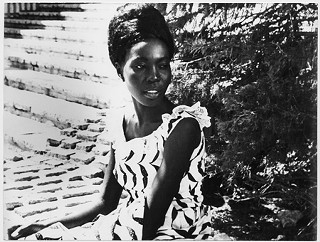Senegal's Père du Cinéma
AFS Essential Cinema explores the films of Ousmane Sembène
By Marjorie Baumgarten, Fri., April 1, 2011
The man commonly regarded as the "father of African cinema" – Ousmane Sembène – died just a few years ago in 2007. He was 84 and left behind a total of 10 feature-length films, a number that seems all the more substantive when considering that he was 40 years old when he made his first movie. His relatively late entry into the world of filmmaking served him well, allowing Sembène to gather a plenitude of life experience and develop a personal philosophy that underpinned his reasons and desire to make movies for the African continent. Like most African nationalists in the mid-20th century, Sembène was a staunch anti-colonialist. But his thinking went beyond the political: Sembène also opposed assimilation, believing that Africans should discover their own systems and culture rather than blend into the structures left behind after the French and other colonists departed their lands. His groundbreaking work is the subject of the Austin Film Society's upcoming series, which will screen eight of Sembène's movies – all but the last two, Faat Kiné and Moolaadé, which are generally available for home viewing.
Sembène was born in Senegal to a Muslim Wolof family. He attended both Muslim and French schools, where he learned French and Arabic besides Wolof, but his education ended in sixth grade. After an aborted stint working with his father as a fisherman, Sembène moved to the capital city of Dakar, where he worked a number of manual jobs until he was drafted into an indigenous North African corps of the French Army in 1944. Back in Dakar after World War II, Sembène participated in a key railroad strike in 1947 before stowing away on a ship to France before the end of the year. There, he was a Citroën factory worker in Paris and a longshoreman in Marseilles, where he became active in the trade-union movement and the Communist Party. It was during this time that Sembène discovered various writers of the African diaspora and, inspired by their work, began writing fiction that drew on his own experiences on the docks, in the trade unions, and among the immigrant workers in Europe.
By the late Fifties and early Sixties, Sembène was an established writer whose novels were known internationally. Upon moving back to Senegal in 1960, however, Sembène became increasingly frustrated with his attempt to infiltrate the cultural lives of his fellow citizens. In one interview, he described his shift to filmmaking as follows: "I realized that with a book, especially in Africa where illiteracy is known to prevail, I could only touch a limited number of people. I became aware that film, on the contrary, was likely to reach broad masses."
Sembène's first film, "Barom Sarret," is a short that he made in 1963. This 20-minute film shows a day in the life of a cart driver in Dakar and will screen with the first feature in Sembène's career, Black Girl, which is based on one of his own short stories. The 1965 film is little more than an hour long, but with this film, Sembène inaugurates his mission to counter the damaging impact of neocolonialist imagery. Black Girl was the first film made by a sub-Saharan director to be seen outside the continent. It was hailed internationally and also received France's prestigious Prix Jean Vigo award. The moving story is a deceptively simple one of a Senegalese governess who is hired by her white French employers and brought to the Riveria to work for them. They treat her more like a maid than a governess, however, and as the girl's dislocation and isolation grow, so does her sense of desperation. The film's original French title, La Noire de ..., conveys an even stronger sense of the girl's ambiguous identity, but either way, the film provides a clear and realistic representation of how colonization can be eradicated more easily from a physical location than from the inner reaches of the mind. Black Girl set the tone for the rest of Sembène's films.
The filmmaker's next movie, Mandabi, was made in his native Wolof, something that fulfilled another of Sembène's ambitions. This film, a comedy about Senegalese bureaucracy, follows the mishaps of a man who is trying to get an identity card so that he may cash a check. This sort of satire of native customs and bureaucratic red tape can be found throughout Sembène's work, perhaps nowhere as clearly as in the final film of the series, Guelwaar, in which the mistaken burial of a local Christian patriarch and philanderer in a Muslim cemetery starts a string of escalating conflicts that are personal, religious, and political in nature. In a movie such as this, it is easy to see Sembène's international appeal: His films speak to universal situations and recognizable human dilemmas while remaining grounded in specific cultures and beliefs. Xala is another comedy that focuses on an important businessman who suffers from impotence; Ceddo is a drama that pits villagers' native religious animism against the rise of Islam and Christianity. Sembène's war experiences inform the films Emitai and Camp de Thiaroye, which focus on the black man's experience fighting the white man's war.
Despite the numerous awards and critical acclaim Sembène received throughout his career, the work of this African filmmaker is not nearly as widely known as it deserves to be. This series goes a long way toward correcting that situation – at least in Austin.
Ousmane Sembène: The Father of Post-Colonial African Cinema
AFS Essential Cinema's Ousmane Sembène series screens Tuesdays at 7pm at the Alamo Drafthouse South Lamar (1120 S. Lamar). Admission is free for AFS members; $8 for the general public. See www.austinfilm.org for more.
April 5: Black Girl (1965)
April 12: Mandabi (1968)
April 19: Emitai (1971)
April 26: Xala (1975)
May 3: Ceddo (1977)
May 10: Camp de Thiaroye (1987)
May 17: Guelwaar (1992)











